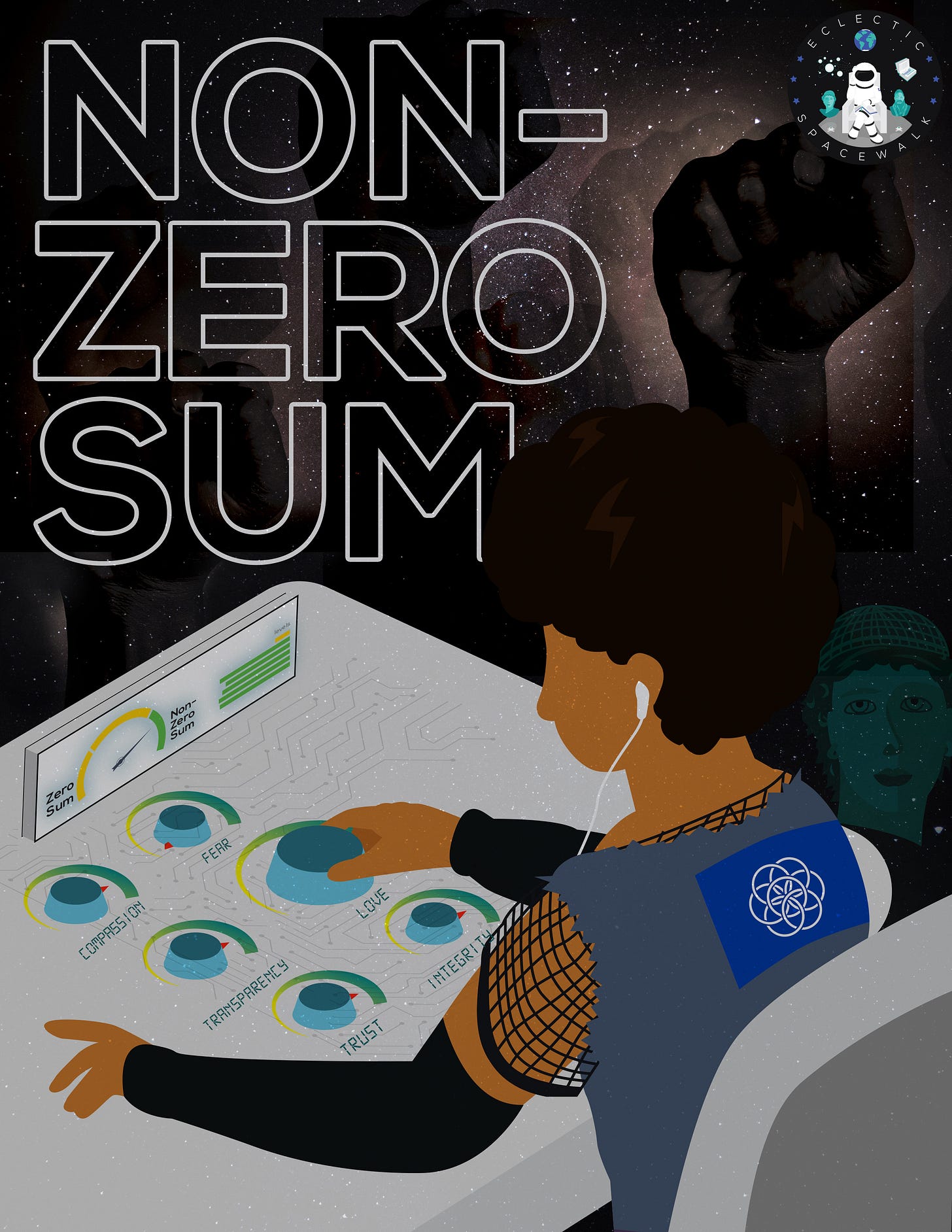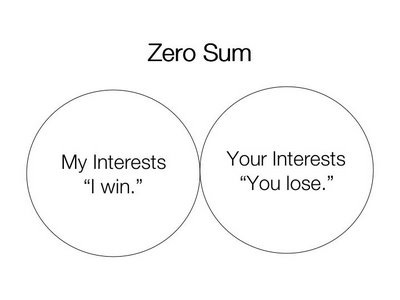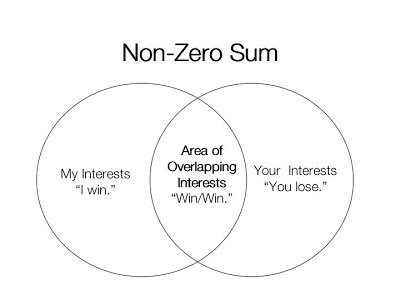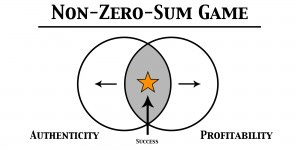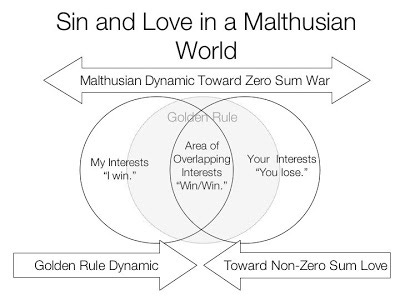Eclectic Spacewalk #4 - Non-Zero Sum
An essay on the importance of non-zero sum thinking during chaotic times
Read previous post #3 - Object-Oriented Ontology (25-30 minutes)
Table of Contents:
Non-Zero Sum—
Zero-Sum Thinking
Non-Zero Sum Thinking
Real Life Games
Aliens have arrived!
Prisoner’s Dilemma
Economics & Goods/Services
Don’t compete, but create!
Similarities far outweigh the differences
“The Non-Zero Sum Character” by Steven Pressfield
Text (3 books)
Audio (4 pieces of content)
Video (5 pieces of content)
What’s Next?
Reading Time: 25-30 minutes (Read sections you find intriguing, bookmark the media/links, and come back to anytime.)
Non-Zero Sum—
Abstract: In game theory, a Zero-Sum game is one where correlations are always inverse. So there is always a binary winner and a loser. In a Non-Zero Sum game the correlations are joined. The circumstances can be either Win/Win, or Lose/Lose. The outcomes are linked!
Zero-Sum Thinking
Launching a moral and values revolution is not easy, but it must be done. We are in the grips of the leviathan that is modernity. A web of connections intersect at the crossroads of artificial intelligence, genetic engineering, global warming, media’s acquiescence to playing fast and loose with the truth, your attention/data being sold to the highest bidder, and capitalism’s unquenchable thirst for infinite growth on a finite planet--all under the fallacy that everything is not heavily influenced by inequality between nation-states and global citizens.
Many countries in the world are experiencing tectonic cultural shifts of all types, including in the United States, where a literal clown reality star president takes our definition of a buffoon to new heights with trade war ping pong, the decimation of any resemblance of climate or environmental agencies, tweeting a classified photo from a presidential briefing, replying to questions of rape with a denial of: “she’s not my type,” and many other behaviors. Hong Kong is currently protesting against the behemoth that is the Chinese state. India is doing shit in Kashmir again. Don’t get me started about the Russians messing around above the Arctic Circle. In Brazil, the Amazon is on fire with pro-big business president Jai Bolsonaro making sure it continues, and Venezuelans continue to be in turmoil.
Why do I tell you all this?
Zero-Sum Thinking
We as a global community of homo sapiens continue to wrestle with what author Robert Wright says is: “a growing lethality of hatred & a death spiral of negativity” and has led to a plague of zero-sum thinking. Wikipedia has so graciously let us in on some examples of zero-sum thinking below. (Pay close attention to number 3 when thinking about immigration, number 6 around thoughts about digital sharing, and number 7 on your personal ideological group biases.)
When students in a classroom think they are being graded on a curve when in fact they are being graded based on predetermined standards.[1]
In a negotiation when one negotiator thinks that they can only gain at the expense of the other party (i.e., that mutual gain is not possible).[5]
In the context of social group competition, the belief that more resources for one group (e.g., immigrants) means less for others (e.g., non-immigrants).[6]
In the context of romantic relationships, the idea that loving more than one person at a time means loving each one less.[7]
Jack of all trades, master of none: the idea that having more skills means having less aptitude (also known as compensatory reasoning).[8]
In the copyright infringement debate, the idea that every unauthorized duplication is a lost sale.[9][10][11]
Group membership is sometimes treated as zero-sum, such that stronger membership in one group is seen as weaker membership in another.[12]
—
Non-Zero Sum Thinking
Robert Wright’s 2006 TED talk & book Non-Zero dissect the above trends as growing significantly around the world - even back in 2006 - and the need to recognize the important heuristic of “zon-zero summness.”
Ancient history reveals that the time scale of our species evolution as hunter gatherers in small, close-knit bands is extensively longer than “civilizations” (in any formal sense) have been around. Think of the enormous scale difference of hundreds of thousands of years (or millions if you want to consider “hominids” like Homo Habilis or Homo Erectus) to the couple of thousand years since the earliest cities. With cities came the “new” view and improved moral stance of:
“All people everywhere are human beings and deserve to be treated like humans.”
Whether via trade, commerce, the silk road, or history - priorities of both competition and cooperation trade places as to what is the most influential to each system. But overall, one could argue on the whole that our history is non-zero sum in terms of progress.
Less hatred and less bigotry are needed. Ultimately this need is grounded in cynicism about other people not doing what is best for the collective and solely for the individual. The problem or saving grace is that you can never take the collective out of the individual, or the individual out of the collective. They are forever linked in their correlations.
This takes us back to zero-sum and non-zero sum with their connected correlations within game theory possibilities.
Two easy examples deal with pies and tennis. If your mom bakes a pie and only half of it is left and your siblings, or friends, AND you want to eat a remaining portion of the pie, you are in a zero-sum game with that other person. The correlations are always inversed! If you have a piece, then the other person loses out on that matching specific amount of pie deliciousness. The same goes for you with their piece. There is a winner and a loser. There is only so much pie to go around!
Now to make this a non-zero-sum game, your mom just needs to bake another pie! Then you and your guest can gorge on as much as you want. (The logic being that everyone eventually will throw in the towel after a certain amount of pie has been scoffed down---a limit if you will.) But remember it becomes a zero-sum game when you take the first piece out of the second pie. You will never look at a shareable dessert the same way ever again.
Another easy example of both a zero-sum and non-zero sum game is tennis. You and your opponent are in a zero-sum game. Someone will win, and someone will lose. But if you play doubles, then you and your partner are playing a non-zero-sum game. Your correlations are joined! They are in the same boat as you (either for better or worse).
Other examples of non-zero-sum items: arms control negotiations, trading gossip, the relationship among genes on a genome, and such transactions as buying a car and buying a book. To recap:
Zero-Sum Games - Correlations are always inverse; there is always a winner and a loser.
Non-Zero-Sum Games- Correlations are joined. Win/Win or Lose/Lose situation.
—
Real Life Games
ALIENS HAVE ARRIVED! -
One of the most used and cliche tropes in science fiction and popular culture is to create an imaginary boogeyman that will destroy us all if we don’t work together. These threats are usually an asteroid or, of course, aliens. We humans are portrayed as willing to rise to the challenge and change! Yay! But would that really happen?? Because REAL boogeymen are actually upon us RIGHT NOW: global warming, the refugee crisis, and all the stories I began this essay with. Sadly, we are hardly doing ANYTHING collectively about them.
My favorite science fiction film currently -Arrival - tries to answer one question: Could humanity finally work together more collectively and fairly? The film has become one of my favorites due to its way of telling an old story in a novel way. At the climax of the movie, the audience sees that the characters are mostly dealing with miscommunication of meaning, the incredible web of language, and the need for a common “truth” that transcends time, culture, or indeed - language!
Caroline McEvoy explains how Arrival rejects hostility thinking (taken from Alexander Wendt’s essay “Anarchy Is What States Make It”) and how it is the choices we make that create international order. It is NOT an inevitable consequence! Catastrophic consequences happen just as easily.
“At one point, Louise translates the alien’s words as saying ‘offer weapon’. This drives several state leaders into a panic and they start preparing for war of the worlds. However, Louise and Ian point out that ‘weapon’ could mean ‘tool’. The aliens might be offering some sort of military assistance or even be asking for our help. Without further information, ‘weapon’ is threatening only if we interpret it as such and act on the assumption that they are hostile. Unfortunately, the outside world seems to do exactly this.”
We could learn from the film through a political lens due to there being reachable Win/Win scenarios, but currently it looks more Lose/Lose.
“Politically, Arrival drives home the point that if we act like the world is a zero-sum game then that is all we will ever get to play because we aren’t open to the possibility that the actions of others could have positive intent. Sometimes the alien will be Predator and sometimes they will be Superman but we do ourselves a disservice if we assume they are either before learning to hear what they are actually saying. More often than not, we can reach a win-win and maybe gain a time-bending language as part of the bargain.” -Caroline McEvoy
—
Prison’s Dilemma -
You and a criminal accomplice are captured by the police. You both are now suspects in a murder, but the police do not have enough evidence to prove it in court. You and your partner are put in separate cells with no way to talk, so you can't collude or cooperate on an answer beforehand. Then both of you are offered a choice: confess or remain silent to the crime.
Because each of you has two possible options, and thus strategies, there are four possible outcomes to the game via ThoughtCo.:
“If both players confess, they each get sent to jail, but for fewer years than if one of the players got ratted out by the other. (Say 5 years.)
If one player confesses and the other remains silent, the silent player gets punished severely (Say 10 years) while the player who confessed gets to go free.
If both players remain silent, they each get a punishment that is less severe than if they both confess. (Say 1 year)
Is it better to cooperate or compete?
Ok dear reader, now exchange your criminal accomplice with someone you will never see again. Does that lower or raise your chances to compete/cooperate? What if this is your cousin? What if your accomplice is your twin?
Does this influence who you compete with and who you cooperate with?
Why??
The “Prisoners’ Dilemma” scenario is highly applicable to a number of fields including business, economics, and politics. LearningTheory.com illustrates the complex trade-off between decisions beautifully:
“The Prisoner’s Dilemma is a reminder that cooperation is not always best.[ii] Immediately cooperating can lead to consequences if the other party is only thinking about personal self-interest. For example, when it comes to salary negotiations, it is not always in a person’s best interest to take the first salary offered. Sometimes it is better to push for a higher salary, even though this might not work out. Another example would be pricing a product. Often it is better for businesses to compete with one another by lowering prices. Lowering prices can lead to higher profit margins than if a business cooperated and priced similarly to other businesses in the area.
On the other hand, The Prisoner’s Dilemma also illustrates that it isn’t always best to look out for one’s self-interest only. When businesses show mutual cooperation, it can lead to increased profit for both of them. Businesses sometimes form mutually beneficial strategic partnerships, such as when Starbucks coffee is sold in Barnes and Noble bookstores. Mutual cooperation is also an important strategy in politics. For example, mutual cooperation between countries may be risky and require compromise; however, it can also be a means of keeping peace and enhancing trade.[iii]”
—
Economics & Goods/Services -
Some like to call non-zero sum the end all be all due to its Win/Win possibility, but I stop short. Non-zero sum does NOT always mean win/win, and it does not intrinsically mean that “good” will prevail. This does not deny inequality, exploitation, or war in any way shape or form.
Let’s say you added up all the people, companies, and products that went into making your complex people-moving machine (vehicle). It would be a net positive for all involved because of the added welfare not just in terms of money but in having a job, putting food on the table, and creating meaning. Sure there may be some winners/losers in specific areas, but overall it is a non-zero-sum game between you and all the people all over the world who made your vehicle.
Manuel Ayau, in the monograph below, provides what might be “the most precise and compelling idea in the history of economic writing.” His main thesis is that trade and cooperation become mutually beneficial to all parties despite differences of capacity and talent among them. Ayau details how the market economy leads to everyone becoming wealthier through cooperation. Comparative advantage is the usual suspect in orchestrating just how this happens.
Now there are plenty of fair criticisms & critiques of comparative advantage, but one cannot argue how that idea was the basis of international trade after World War I.
Ayau’s conclusion solidifies the idea of what one should consider when thinking about economics and the exchange of goods and services.
“Free trade means the ability of producers to exchange their wares with anyone on the globe for other goods without some government standing in the way of some of those exchanges due to the country of origin of the goods involved. It requires no more laws or institutions than are necessary to provide standard protection of the property rights of all involved in the exchange. It is the application of laissez[-]faire across international borders: nothing more, nothing less.”
We clearly are not in the promised land of free trade, but at the very least the idea continues to win in the battles of BIG ideas."
“Multivolume documents paying lip service to free trade but forbidding transactions by parties whose competitive advantages are considered by some to be unfair are the antithesis of free trade no matter how many times the words free trade appear in their pages. That managed trade proponents hide the nature of their policy preferences under the cloak of free trade reveals their utter shamelessness. It also suggests that the free trade side is winning the battle of ideas.”
—
DON’T compete, but create!
Darius Foroux is a master in personal growth, especially with business types, and has some advice for them and for everyone in his post about creating and the Abundance mindset: “If you think that you have to compete for better jobs or more market share, you’re as wrong as I was.”
Competition says that if someone has a job, then that means you can’t have the same job. The same goes for a specific market share because that means you have to compete with other companies to “win” a piece of their share. Darius’s learning and the education of almost everyone who went to business school was based on competing with other businesses. Almost every business book also assumes business is competition.
Competition is like a mind demon that cannot be exorcised unless we radically change our way of thinking about the world. Darius explains how it is limited thinking.
They couldn’t be more wrong. When you assume that you have to compete with other businesses or people for money, jobs or attention, you’re engaged in limited thinking.
Instead, we must adopt an abundance mindset. Wallace D. Wattles, one of the first famed personal development authors, said it best:
“You get rid of the thought of competition. You are to create, not to compete for what is already created. You do not have to take anything away from anyone.”
He goes on by saying that fear begets fear, and the need to create.
The biggest mistake that conventional business thinkers make, is that they believe supply is limited. But that’s not always the case. But even if it was the case, it’s harmful to adopt that mind[-]set.
…
There’s enough opportunity for everyone in the world. The problem is that most people don’t use opportunities.
If you want to have a specific career, go out there and create it. The same is true for your business. And don’t focus on limited resources, naysayers, or any other reason you should not do it.
“Adopt an abundance mindset. Before you know it, you’ll have so much opportunity that you don’t know what to do with it… Create, Create, Create!” - Darius Foroux
—
Similarities far outweigh the differences.
You have more in common with any human on earth than you might think. Among other characteristics, you share your anatomical structure, basic psychology, and social groups. You may disagree with someone and even have different lives. However, even the elements you have to deal with are more similar than different. From the seasons turning to the feeling of “butterflies in your stomach” with a significant other to the feeling of loss are what we call universals.
If you are still having trouble with pushing down your demonization of the other, and need a non-human answer. Nicholas Kristof’s example in his book Blueprint is a fantastic one.
Say you have two hills:
One is 300ft tall.
One is 900ft tall.
“Wow” the reader says, “one hill is 600 ft taller than the other one! Dare I say, the difference is quite large.”
“Dear reader, You may not say!” I exclaim.
“Everything is a matter of perspective!”
What the reader did not know was that you were looking at these hills from the perspective of a nearby mountaintop 10,000ft up through some telescopic viewing apparatus. If you take your eye off the binoculars or telescope, then you see that those tiny hills next to each other are indeed very similar. This view transcends the hyper-localized individual and subjective erosion patterns of this hill or that hill, and sees the hills as a slight uniqueness to a much larger interconnected web of geological and planetary system forces. If you went into space and looked down on Earth, you would see that that 10,000ft mountain is again not so different from even Mt. Everest! (You would also experience “The Overview Effect” of course.)
It is counter-intuitive, but we have evolved these big prefrontal cortices to cut through this temporary speed bump in critical thinking. You are INDIVIDUALLY better off WHEN the COLLECTIVE is also doing better. We are already in a non-zero-sum game; people just don’t know it yet. Our correlations are JOINED! We can either decide to actually start planning for a win-win, or we can continue on our present course, seemingly toward a lose-lose nightmarish situation as in George Orwell’s final warning.
Do we want to be a checkpoint in the evolutionary chain of life (we ultimately will no matter what), or can we finally start to use our brains to design and use ethical technology to help the most vulnerable among us?
The former situation is fine for the rugged individual and the callous soul of privileged indifference, but the latter is a much more awe-inspiring story of progress and ultimately better off for each person (even for those selfish rugged individuals).
“A rising tide lifts all boats.”
Major moral progress has to happen for Humanity to transcend our recent swing back to zero-sum thinking, and continue the progress of non-zero-sum thinking. In Robin Wright’s view that is the only way. I tend to agree that “non-zero sumness” in more areas of life has to be central, along with a massive psychedelic renaissance amongst other things.
I and everyone on Earth need EACH of you readers to look at your moral compass and push toward a win-win non-zero-sum game.
—
The Non-Zero Sum Character
In closing, I would like to quote in full Steven Pressfield’s exquisite post “The Non-Zero-Sum Character.” (Also, if you haven’t read “The War of Art & Turning Pro” you are doing yourself a disservice. Awaken the creative artist within you!)
“Here, in no particular order, is a sampling of real-life non-zero-sum characters.
Jesus of Nazareth
The 300 Spartans at Thermopylae
Joan of Arc
Abraham Lincoln
Mahatma Gandhi
Dr. Martin Luther King, Jr.
John F. Kennedy
Malcolm X
Robert Kennedy
John Lennon
Yitzhak Rabin
And a few from fiction and motion pictures:
Odysseus
Beowulf
Atticus Finch
Huckleberry Finn
Celie in The Color Purple
Rick Blaine in Casablanca
Pike, Dutch, and the Gortch Brothers in The Wild Bunch
Captain Miller (Tom Hanks) in Saving Private Ryan
Shane
Travis Bickle
Princess Leia
Luke Skywalker
If the Villain believes in a zero-sum world, the Hero believes in its opposite.
If the Villain believes in a universe of scarcity, the Hero believes, if not in a world of abundance, then at least in the possibility of such a world.
If the Villain believes in a reality dominated by fear, the Hero believes in one ruled by love.
The Villain is cynical. He or she believes that mankind is inherently evil. The Villain believes in “reality,” in a Hobbesian world of all-against-all.
The Villain is not necessarily “bad” or even “villainous.” In the villain’s eyes, he is the Good Guy. He is simply acting and making choices within a universe of monsters. He must therefore become, in the name of Good (or at least self-preservation or the preservation of those dear to him) a monster himself.
The zero-sum view of life is that of limited resources. Not enough to go around. If you and I want our share (or even simply enough to survive), we must take it from somebody else. However much of the pie we grab, that’s how much less remains for everyone else.
In the non-zero-sum world, on the other hand, resources are infinite. The love a mother gives to her child (and that the child returns) grows greater, the more each loves. There is and can never be a shortage of love.
Compassion is infinite.
Integrity is infinite.
Faith is infinite.
Zero-sum versus non-zero-sum. Which point of view do you believe?”
Text:
1) Nonzero: The Logic of Human Destiny by Robert Wright
“The title of this book, Nonzero, refers to the concept of the "non-zero-sum," which comes from game theory. Looking at human history--and for that matter the whole history of life on earth--through the lenses of game theory can change your view of life. At least, that is a premise of this book. What exactly is meant by "change your view of life"?”
2) Not a Zero-Sum Game: The Paradox of Exchange by Manuel F. Ayau
“If this idea of what Mises called the Law of Association were better understood, many socialistic misconceptions about the market economy would fall by the wayside. Ayau explains it through simple diagrams and illustrations that will change the way you think. about issues of trade, equality, and social development.”
3) Finite and Infinite Games: A Vision of Life as Play and Possibility by James P. Carse
“An extraordinary book that will dramatically change the way you experience life.
Finite games are the familiar contests of everyday life, the games we play in business and politics, in the bedroom and on the battlefield -- games with winners and losers, a beginning and an end. Infinite games are more mysterious -- and ultimately more rewarding. They are unscripted and unpredictable; they are the source of true freedom.
In this elegant and compelling work, James Carse explores what these games mean, and what they can mean to you. He offers stunning new insights into the nature of property and power, of culture and community, of sexuality and self-discovery, opening the door to a world of infinite delight and possibility.
"An extraordinary little book . . . a wise and intimate companion, an elegant reminder of the real."-- Brain/Mind Bulletin”
Audio:
Video:
Playlist
https://www.youtube.com/playlist?list=PL8ADA5JhLe29DOSY5trY2I1WvkAX2FiTI
—
1) Robert Wright - The Logic of Non-Zero-Sum Progress
2) Kurzgesagt In a Nutshell - Egoistic Altruism
3) Simon Sinek - What Game Theory Teaches Us About War
4) The Prisoner’s Dilemma - This Place
5) Paramount Pictures - Arrival
What’s Next?
The next newsletter will be on: “Skin in the Game” principle championed by Nassim Nicholas Taleb.
If you enjoyed this post, please share with other potential eclectic spacewalkers, consider subscribing or gift a subscription, or connect with us on social media to continue the conversation! Also, I am an advocate of Bitcoin. My address is on my About.Me page if you are feeling extra curious.
Subscribe to Substack Newsletter
Listen to all podcasts on Anchor
Follow Eclectic Spacewalk on Twitter
Thank You for your time. Until the next post, Ad Astra!



